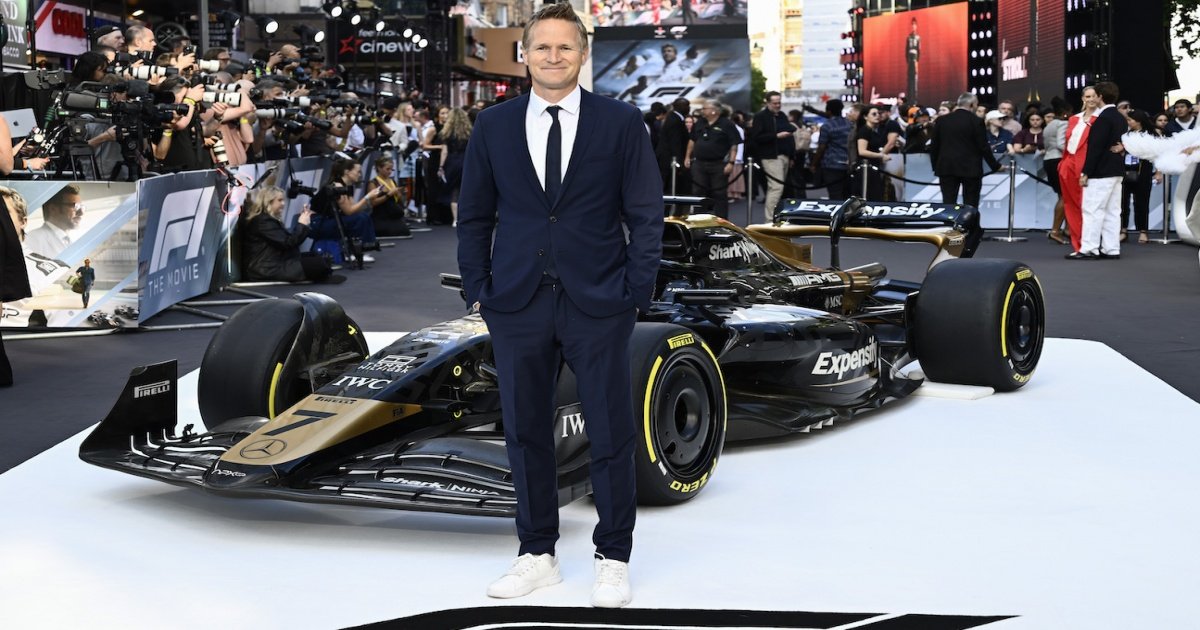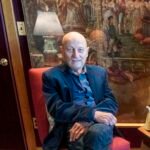
Apple Music’s Oliver Schusser is still buzzing about the previous evening’s premiere of F1 The Movie when Music Week meets up with him at the tech giant’s glass-roofed Battersea HQ in London.
The vice president of Apple Music, Apple TV+, Sports and Beats was in attendance (pictured above) at the London launch of the Apple Original Films’ box office hit along with artists featured on the soundtrack including Ed Sheeran, Tate McRae and Raye.
Schusser admits that he’s now seen the F1 movie six times, which perhaps hints at the Apple veteran’s attention to detail in a role that now has a wide remit. Recently appointed co-heads of Apple Music, Ole Obermann and Rachel Newman, report to him.
In his 21 years at the company, Schusser has been strongly associated with music and supporting artists, including the Apple Music Festival, which ran for a decade at London’s Roundhouse until 2017.
Today Schusser – who mentions that he’s a dance music fan – is here to talk to Music Week about the first decade of Apple Music, a period which has seen the industry transformed by streaming.
But he’s also excited about the future possibilities as Apple expands the creative opportunities for artists beyond track streaming and Apple Radio, whether that’s filmed documentaries and live performances, podcasts or DJ sets recorded in spatial audio.
To coincide with the 10th anniversary, Apple has unveiled a new state-of-the-art studio space in Los Angeles dedicated to artist-driven content, innovation in audio and deeper fan connection.
Ryan Newman, head of music editorial & major label business partnerships (UK & Ireland), points out that the Apple has just worked with Stormzy and #Merky Films on the Big Man film shot on iPhone 16 Pro (14 million YouTube views and counting). It’s one of many ways that Apple can work with artists, along with the London Apple Music Sessions (which has featured Maisie Peters, The Last Dinner Party and Griff) and the Origin Stories podcast.
“We have the showcase that allows artists to tell their stories in the most impressive way,” he told Music Week. “We’re dedicated music fans that want to provide stars for tomorrow, stars for now and really continue to lead the charge on that experience.”
At a time when it’s been tough for UK talent to cut through, Myles Smith and Lola Young both received early support from Apple Music on the streaming platform.
“We’re at the forefront of the conversation in that respect,” he said. “It’s become harder in certain years, for sure, but we still champion artists in the way we should do, and only Apple can do.”
“We’ve been championing Raye since day one,” added Schusser. “We’ve done a great piece with her on Apple Vision Pro that’s incredibly innovative and cool. The team has always had a really close relationship with her and her team. Everything we do from here [in London] is global.”
That support for artists will now be supercharged with the opening of the new studio space in LA.
“It is a home for artists from Apple Music, where we have radio studios, we have a performance space,” said Schusser. “You have a marketing suite where you can take photographs and do social media. We have editing booths. You can go in and mix your DJ Mix in spatial audio. It’s three floors, it’s a really big building, and it will be a great way for us to interact with artists and do more things.”
 Apple Music’s new studio space in LA
Apple Music’s new studio space in LA
Crucially, Apple Music subscribers will get to see the fruits of this creative space, which can also host performances with an audience.
“Apple Music Live is our monthly concert series and we record it for the service,” said Schusser. “They can do a DJ session, or two artists can just come in and jam together or write a song together. It’s going to be a very fluid space, it’s really beautiful.
“We’ve actually had a couple of artists in for hard-hat tours, while we built it,” he added. “Because we built it with artists in mind, we wanted to get that feedback about the spaces that they wanted to use.”
While you would expect a tech company to focus on the future, Music Week’s meeting with Schusser is also an opportunity to reflect on how we got here. Here, he discusses what makes the music streaming service unique, their relationship with artists and the next decade…
How do you feel about Apple Music’s role in streaming 10 years on from launch, because there are several competitors?
“First of all, it feels like we’ve been in the music business for 25 years, if you go back to iPod and iTunes, when digital music really started. I think we pioneered that with the iTunes Music Store and 99p downloads and everything. Believe it or not, that was almost 25 years ago. As a company, if you look back – Apple is nearly 50 years old – the way Steve [Jobs] started Apple was all with creators in mind, whether it was a filmmaker, a photographer or an artist or a songwriter. We’ve got Logic, Garage band… So it feels like we’ve been in the music business for 50 years, since we started the company. iTunes was a huge success, it actually still is a relatively big business. But, of course, the world moved on to streaming.
“So 10 years ago, we launched Apple Music. We’re super happy. We’ve always wanted Apple Music to be a service that’s for real music fans, because it’s made by real music fans. So that’s why we hired Zane Lowe, for example, or Dotty or Julie Adenuga, Ryan [Newman], people who live and breathe music – and I would include myself in that too. So we always felt like Apple Music is the service if you’re a real fan, if you want more than just the music that’s the service to be in.”
We wanted to have a more engaging, more artist-friendly service, and that’s what Apple Music is 10 years later
Oliver Schusser
What makes Apple Music a distinctive service?
“So for me, there are three things about Apple Music that are different. First of all, we’re all about quality. We believe that the way music is displayed, the way is metadata is shown – and we have very low [streaming] fraud – everything on the service is trying to be as premium as possible. It’s curated by people who love music. And you get the best and the highest sound quality of any service with Spatial Audio and Atmos. Number two, we’re very focused on music. Our competitors are running away from music, and they put podcasts and audiobooks and all sorts of other things into their services. But we’re very, very focused on music. And we’re in the music business because of music, not for any other reasons. We don’t want to build an audio supermarket.
“Thirdly, we’ve always been the home for artists and the most artist-friendly company. It starts with how much we pay – and we pay everyone the same – and the platform we provide. When they have a new project, artists will come to us and do an interview with Zane, or maybe do a radio show, or maybe video or a sync with us; or we would just sit down with the writer of the song and do a track-by-track analysis. That’s really how we built Apple Music Radio, and all these tools that we have for artists to express themselves. When we launched Apple Music, we were worried that music would become a commodity, where people press a button and it just plays in the background, and you don’t really know what artist is playing and singing. So we wanted to have a more engaging, more artist-friendly service, and that’s what Apple Music is 10 years later.”
Your own role now covers multiple areas. Does music connect across those?
“Yeah. After we launched the iTunes Music Store here in the UK in 2004, we did launch TV downloads and movie downloads later on. We created a multimedia experience within iTunes. Apple Music was the first subscription service that we launched. Since then, we’ve had Apple TV+, a very successful film and TV service. We’ve launched Apple News+, Apple Fitness+, we’ve got iCloud. With Apple One [bundle subscription], you can get them all with one click. They’re all trying to be the quality leader. They all have privacy written all over it, and that’s really important to Apple. They’re all as global as possible.”
The 10th anniversary also coincides with new co-heads of Apple Music. What are the priorities for the service?
“By the way, the timing [of the appointments] is a little bit of coincidence. But yes, I think we’re super-proud of what we’ve built in the last 10 years, but we’re never really about celebrating anniversaries or looking back but looking forward. We think that there are incredible opportunities for music and music streaming, starting with AI [tools], but that’s just really one component. AI is going to provide incredible opportunities to make the service better, easier, more fun. Just a couple of weeks ago, at the developer conference at Apple, we announced a couple of features – lyrics translation and pronunciation and a feature called AutoMix, where we’re stitching music in a playlist together as a continuous mix. AI helps with beat matching and making sure we find the right moment of the song to stitch them together. We’re going to continue to focus on music, and we’ll continue to focus on building great features, and we’re excited about that.”

Oliver Schusser, second left, at the 2024 Apple Music Super Bowl LVIII Halftime Show press conference with Apple execs including Rachel Newman (now co-head, Apple Music) and Usher (credit: Kevin Mazur/Getty for RocNation)
And what would you say about Apple’s Music’s market position globally and in the UK? We don’t get a lot of numbers from Apple…
“We like talking about our products, and we like building new features for our customers, rather than just talking about numbers. The UK has always been a very strong market for us. You and I have talked before about the iTunes Festival that went on for 10 years here. We have a radio station at Tileyard that’s run by incredible people that make really awesome content that is highly successful. Culturally, we’ve always had a really strong tie to the UK. And we’re now here sitting in the Battersea Power Station, which, from a music industry point of view, is so iconic.”
Streaming can sometimes be seen as impersonal, has Apple Music managed to overcome that issue?
“When we launched Apple Music, that’s exacty what we tried to avoid. With Apple Music Radio, we’ve got six radio stations that are curated by people like Zane Lowe. The idea behind it is that it’s a one-to-many stream. It’s professional DJs recommending music. We’ve got Apple Music 1, Apple Music Hits, we’ve got a country station. We have a dance station called Club, we’ve got a Latin station and we’ve got a chill station. But more importantly, what that team does is artist relations, because they also do huge interviews with artists, or track-by-tracks. These interviews could happen on the radio station, but they also happen on the [Apple Music] platform. Zane just did an interview with Miley Cyrus that has already had more than 25 million views. We want to be the most artist-friendly platform and provide artists with a way to communicate to their fans, and that is very rare these days. Most other platforms aren’t even interested in albums. We still celebrate the album as an art form, because that’s what the artist worked on in the studio for 12 months and so we think that’s important to represent it that way.”
And Elton John’s had this great involvement as well over the years, in particular supporting new artists…
“He’s been doing the Rocket Hour since day one, for 10 years. At Apple, we have always taken a bit of a risk in championing new artists. We have even done that through our syncs for many of our ads, if you remember the silhouette campaign we had in the iTunes days, and for the Apple Watch and the Mac. We always pick and choose up-and-coming talent that we think the world should actually see and discover – we’re super proud of that, and that’s what we’re all about.”
We’re fundamentally against the idea of free music services
Oliver Schusser
The music industry has welcomed the development of paid streaming but not so much the ad-funded model. Why has Apple not gone down this route?
“We’re in the music business because we love music, and we look at music as art. We don’t understand why people think it’s a good idea to give away art for free. So we’re fundamentally against the idea of free music services. And by the way, we’re the only service that doesn’t have a free service. You can line up all of our competitors, everyone has a free service. It’s a bad idea to give away music for free and. In order to watch Ted Lasso, you have to sign up to Apple TV+, and in order to watch Squid Game you have to sign up to Netflix. They’re not going to give it away for free on any service, and that’s the way it should be. So it’s crazy that 20 years into streaming, we have hundreds and hundreds of millions of people consuming every new album that’s out there for free. That’s not the way it should be, artists are unhappy with that and I understand that.”
How are you expanding the role of music across the Apple ecosystem?
“Apple Music Live, that is exclusive live shows that we have on the platform. We have the radio shows from Apple Music and Apple podcasts. We work very closely with Apple News+, so all the written interviews that we do, we publish on Apple News+. So we try to make the content available across all of our ecosystem. On Apple TV+ we’ve had a number of really successful documentaries, including on Selena Gomez and Billie Eilish. So the music team here does a lot more than just managing the day-to-day of the Apple Music platform, but also managing music overall in the company. We have a lot of music, even with Beats and AirPods, in the business. The Beats brand was really built on music and on hip-hop culture. So you can find music all over Apple. As a company, we love music, we’ve always loved music. You see that in our ads, you see that in how we speak, see our management going to festivals, it really is part of our DNA.”
 Oliver Schusser at the F1 premiere in London (credit: Gareth Cattermole/Getty Images for Warner Bros Pictures)
Oliver Schusser at the F1 premiere in London (credit: Gareth Cattermole/Getty Images for Warner Bros Pictures)
If Apple Music is not reporting as a standalone business, how do you measure success?
“First of all, as I said before, we don’t really like to talk about numbers. We like to talk about products and customers. It’s really important that we create a platform for our partners, in this case, artists and labels, to be successful. The good thing about streaming is that it’s actually created a healthy marketplace where, if you look at the latest results, everyone’s making more money overall in the marketplace, it is really successful. We’re really happy with where we are with Apple Music. We’ve built a great product, we’ve built a beautiful business, and I think we have a great differentiator to our competitors.”
What would you say about price rises because the music industry now seems to expect regular increases, perhaps every 18 months?
“Well, I don’t really care what the music industry expects. We’re very focused on providing great value to our customers. A couple of years ago we put the price up, we were actually the first to put the price up. We put it up worldwide, across every tier. It was at a time when we had created Spatial Audio, which was a whole new listening experience, and it was a new audio format. We wanted to make sure we gave that to all subscribers, and that significantly increased the quality of the service overnight. We felt like it was just fair, given the value exchange and the additional value, to put the price up. We’ll monitor pricing everywhere, but our focus is on providing great value to customers.”
By providing Spatial Audio and Dolby Atmos to all subscribers, it was like you upgraded to a premium service at a standard price. Was that a big call?
“It was, and it was actually something that only Apple can do, because it’s not like other people haven’t tried creating new audio formats. What was special about Apple was we had the connection between hardware, software and services. We wanted to create a standard that works on all headphones, at least on all of our headphones, on all devices, and where people would hear the difference. And so that required us to work with our hardware team, with the iOS software team and with the music engineering team. And then we brought in Dolby to create something that a) worked on that many devices, and b) people instantly heard the difference. And the vast majority of people like it better. So yes, you’re right, given how much people loved it and how much content is now made in Spatial Audio and Dolby Atmos, it has literally overnight positioned us as a premium service, which is what we wanted to be. More than 90% of our subscribers are listening in Spatial Audio and the vast majority of all new songs and albums are delivered in spatial audio.”
Spotify announced its version of HD audio before Apple in 2021 but has yet to launch, so does that indicate the technical challenges?
“That’s right. Yes, it was technically one of the most complicated, most sophisticated things we’ve done.”
We think that there are incredible opportunities for music and music streaming, starting with AI
Oliver Schusser
There’s been a debate in the UK about remuneration for songwriters and artists. Do you feel that is going to get settled soon?
“Well, it’s an ongoing issue for the industry, and we have always been on the side of the creators, whether it’s a songwriter, whether it’s an artist. We even pay DJs, because we have a lot of DJ mixes, and we have Shazam technology that can identify what’s in the DJ Mix. The problem in the DJ space is that unless the DJ is mixing their own music, they’re not getting paid for the mix because only the music in the mix is getting paid. We have a pool and a fund to remunerate DJs. So we’ve always been on the side of the creators. We’re also very simple [in our approach], we pay every label the same rate, and our per play rate is higher than anyone else’s rate. We can’t comment on what our competitors do, but we’re completely and fundamentally against free music because the pay-per [stream] rates are just too small. It’s unfair, and it’s not artist- and songwriter-friendly. We want everyone to be paid and compensated well.”
Finally, there’s lots of talk of streaming 2.0 and new tiers. Where do you see Apple Music going in the next decade?
“So my personal view is, first of all, if you look at the history of music, new formats have always come and replaced old formats. The good thing is that streaming is so good for customers. Think about it, you pay £10, £11, £12, whatever plan you’re on, and you get all the music ever recorded on all devices, in your car, anywhere in the world, wherever you travel. It’s pretty amazing. So I think it’s here to stay. Our challenge and opportunity is to make sure music continues to be as relevant as it’s ever been, and artists have a platform to express themselves, and we are at the forefront of that. And then we will use technology to make the service better. We think AI has incredible opportunities, as I mentioned before. Again, our focus will be on premium features, premium quality, focused on music and focus on artists.”






